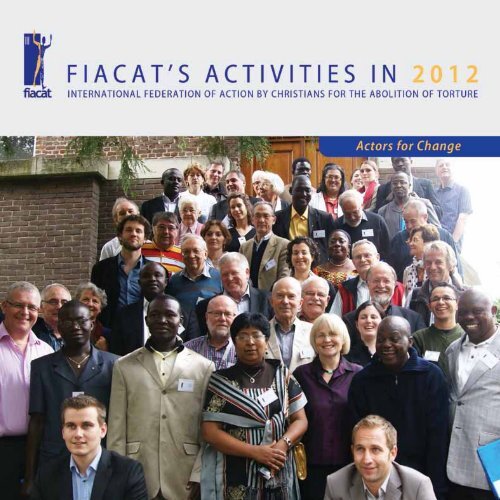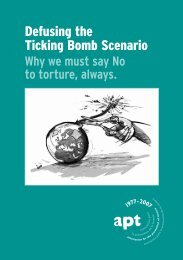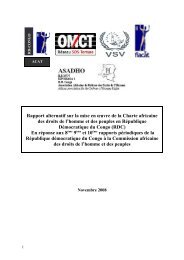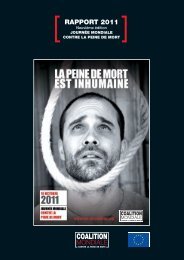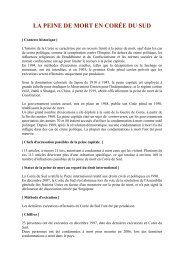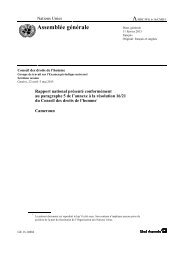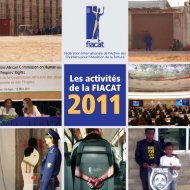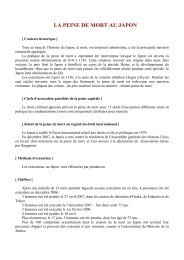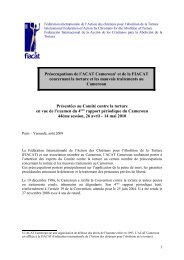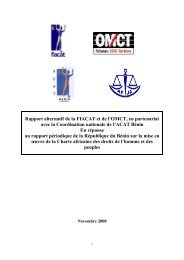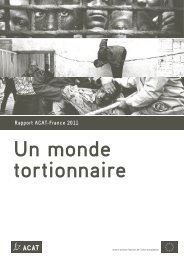You also want an ePaper? Increase the reach of your titles
YUMPU automatically turns print PDFs into web optimized ePapers that Google loves.
Summary<br />
<strong>FIACAT</strong><br />
27, rue de Maubeuge<br />
75009 Paris – France<br />
Tel. +33 (0)1 42 80 01 60<br />
Fax. +33 (0)1 42 80 20 89<br />
E-mail. fiacat@fiacat.org<br />
<strong>FIACAT</strong> Representation to the UN<br />
in Geneva<br />
c/o CCIG<br />
1 rue de Varembé<br />
P.O. Box 43<br />
1211 Geneva 20 – Switzerland<br />
Tel. +41 787 499 328<br />
E-mail. fiacat.onu@fiacat.org<br />
Design by Mémoire de l’œil - 06 18 17 68 44<br />
ISSN 1816-1316<br />
What is <strong>FIACAT</strong>?<br />
Message from the President<br />
Action at international level<br />
<strong>FIACAT</strong> at the United Nations<br />
The Treaty Bodies<br />
<strong>FIACAT</strong> and the Human Rights Council<br />
<strong>FIACAT</strong> and the ACHPR<br />
51st Ordinary Session (18 April to 2 May <strong>2012</strong> – Banjul, Gambia<br />
52nd Ordinary Session (25th anniversary of the Commission, 18 to 22 October <strong>2012</strong> at Yamoussoukro, Côte d’Ivoire)<br />
Inter-session activities<br />
<strong>FIACAT</strong> and the Council of Europe<br />
<strong>FIACAT</strong> and the European Union<br />
<strong>FIACAT</strong> and the International Organisation of La Francophonie (OIF)<br />
Action with the ACATs<br />
<strong>2012</strong> <strong>FIACAT</strong> International Seminar on “Human dignity: exchanging perspectives.<br />
What can Christians contribute today?”<br />
<strong>FIACAT</strong> International Council, 20-22 June <strong>2012</strong>, Brussels, Belgium<br />
Abolishing the death penalty in Africa<br />
CLOSE-UP ON: Dakar Seminar (12-14 November <strong>2012</strong>)<br />
CLOSE-UP ON: Abolition of the death penalty in Benin<br />
End of the three-year programme: Prevention of torture in detention centres in Burkina Faso<br />
Protection for members of the <strong>FIACAT</strong> network<br />
<strong>FIACAT</strong>’s work within coalitions<br />
The International Coalition against Enforced Disappearances<br />
The World Coalition against the Death Penalty<br />
CLOSE-UP ON: World Day against the Death Penalty<br />
CLOSE-UP ON: Ratification of the Second Optional Protocol to the ICCPR on the abolition<br />
of the death penalty<br />
CLOSE-UP ON: Increasing the number of countries which support UN General Assembly resolutions<br />
calling for a universal moratorium on executions<br />
<strong>FIACAT</strong>’s Finances in <strong>2012</strong><br />
<strong>FIACAT</strong>’s team in <strong>2012</strong><br />
<strong>FIACAT</strong>’s network members in <strong>2012</strong><br />
2<br />
3<br />
4<br />
4<br />
4<br />
6<br />
7<br />
7<br />
8<br />
9<br />
10<br />
11<br />
11<br />
12<br />
12<br />
13<br />
13<br />
14<br />
14<br />
15<br />
16<br />
17<br />
17<br />
17<br />
17<br />
18<br />
19<br />
19<br />
20<br />
21
What is <strong>FIACAT</strong>?<br />
Message from the President<br />
The International Federation of Action by Christians<br />
for the Abolition of Torture, <strong>FIACAT</strong>, is an international<br />
non-governmental human rights organisation, set up in<br />
1987, which works towards the abolition of torture and<br />
the death penalty. The federation brings together some<br />
thirty national associations, the ACATs, present in four<br />
continents.<br />
<strong>FIACAT</strong> – representing its members in international<br />
and regional organisations.<br />
It enjoys Consultative Status with the United Nations<br />
(UN), Participative Status with the Council of Europe and<br />
Observer Status with the African Commission on Human<br />
and Peoples’ Rights (ACHPR). <strong>FIACAT</strong> is also accredited to<br />
the International Organisation of la Francophonie (OIF).<br />
By referring the concerns of its members working on the<br />
ground to international bodies, <strong>FIACAT</strong>’s aim is to encourage<br />
the adoption of relevant recommendations and<br />
their implementation by governments.<br />
<strong>FIACAT</strong> works towards the application of international<br />
human rights conventions, the prevention of torture in<br />
places of detention, and an end to enforced disappearances<br />
and impunity.<br />
<strong>FIACAT</strong> – building up the capacities of the ACAT<br />
network in thirty countries<br />
<strong>FIACAT</strong> assists its member associations in organising themselves,<br />
supporting them so that they can become important<br />
players in civil society, capable of raising public awareness and<br />
having an impact on the authorities in their country.<br />
It coordinates the network by promoting exchanges, proposing<br />
regional and international training events and joint campaigns,<br />
thus supporting the activities of the ACATs and providing<br />
them with exposure on the international scene.<br />
<strong>FIACAT</strong> – a network of Christians united in fighting<br />
torture and the death penalty<br />
<strong>FIACAT</strong>’s mission is to awaken Churches and Christian organisations<br />
to the scandal of torture and the death penalty and<br />
convince them to act.<br />
The impact of our action:<br />
• <strong>FIACAT</strong> protects human rights defenders in its network.<br />
In this context, it has been able to secure the release of<br />
several ACAT members arrested because of their human<br />
rights activities.<br />
Sylvie Bukhari-de Pontual<br />
Meeting in Brussels (Belgium) in June <strong>2012</strong> on the occasion<br />
of the <strong>FIACAT</strong> International Council, ACAT representatives<br />
reflected on their commitment as Christians to<br />
secure respect for human dignity everywhere and always.<br />
gnatory states – “against tyranny and oppression” and as<br />
an objective to be achieved. It was thus established as<br />
a fundamental value of democratic societies, respect for<br />
which should be unconditional, since the human person<br />
alone is the source and embodiment of dignity. Recognition<br />
of human dignity is “the foundation of freedom, justice<br />
and peace in the world”.<br />
Since then, human dignity has been regularly contested<br />
and at the same time invoked as never before. It is<br />
threatened by scientific innovation (especially in the field<br />
of genetics), by the surge in economic and financial globalisation,<br />
by the “commoditisation” of people (modern<br />
slavery, waves of economic or political migration), by the<br />
sophistication of the means of constraint (no longer only<br />
physical but also psychological and moral).<br />
Today, then, it is more important than ever before to<br />
protect, and to ensure effective respect for, the dignity<br />
of each human being since, as underlined by the philosopher<br />
Paul Ricoeur, dignity is a requirement older than<br />
any philosophical formula, a requirement on the basis<br />
of which something is due to a human being simply by<br />
virtue of the fact that he/she is human. This means defending<br />
freedom but also encouraging the assumption of<br />
responsibility for ensuring solidarity – even brotherhood<br />
– with others.<br />
It also takes part in the campaign against the death penalty<br />
by calling on states to abolish capital punishment in<br />
their legal systems.<br />
To give added impact to these efforts, <strong>FIACAT</strong> is a founding<br />
member of several campaigning coalitions, in particular<br />
the World Coalition against the Death Penalty<br />
(WCADP), the Coalition of International NGOs against<br />
Torture (CINAT) and the International Coalition against<br />
Enforced Disappearances (ICAED)<br />
• Thanks to the advocacy work carried out by <strong>FIACAT</strong> in<br />
cooperation with its member associations, Burundi,<br />
Togo and Benin have abolished the death penalty<br />
over recent years.<br />
• <strong>FIACAT</strong> encourages countries to combat prison overcrowding<br />
by restricting excessive pre-trial detention<br />
and encouraging alternatives to imprisonment.<br />
The dignity inherent to all human beings is proclaimed<br />
in the Preamble to the Universal Declaration of Human<br />
Rights (UDHR) and gave rise to the most famous article<br />
in the UDHR, Article 1: “All human beings are born free and<br />
equal in dignity and rights. They are endowed with reason<br />
and conscience and should act towards one another in a<br />
spirit of brotherhood.” In 1948, as part of the legacy of<br />
Kantian thought, human dignity was considered as both<br />
a moral and a legal reference – even if it had only the<br />
value of a declaration, placing no obligation on the si-<br />
It is in this context that, with the support of <strong>FIACAT</strong>, their<br />
international Federation, ACAT members - Christians in<br />
the service of the common good - contribute to respect<br />
for human dignity by pursuing resolutely their campaign<br />
for the abolition of torture and the death penalty.<br />
Sylvie Bukhari-de Pontual<br />
President of <strong>FIACAT</strong><br />
2 3
Action at international level<br />
<strong>FIACAT</strong> at the United Nations<br />
<strong>FIACAT</strong> is actively involved in the work of the Human Rights<br />
Council and the United Nations Treaty Bodies. This involvement<br />
takes several forms: <strong>FIACAT</strong> acts as a representative<br />
and an advocate, it maintains contacts with the committees’<br />
experts and works in partnership with other NGOs.<br />
However, a distinction should be drawn between two types<br />
of involvement: <strong>FIACAT</strong> works either within the framework<br />
of the treaty bodies or in the Human Rights Council.<br />
The Treaty Bodies<br />
The Treaty Bodies are committees that monitor the<br />
member States’ implementation, after ratification, of the<br />
Convention that they have ratified. To this end, the Committees<br />
regularly consider member States’ reports on the<br />
way in which they have applied Convention provisions.<br />
At the end of this process, the Committee adopts its<br />
‘Concluding Observations’ which note the positive aspects<br />
of the State’s application of the instrument as well as the<br />
areas where the Committee recommends that it take additional<br />
action.<br />
CLOSE-UP ON:<br />
The 49th Session of the<br />
Committee against Torture<br />
November <strong>2012</strong>, Geneva:<br />
<strong>FIACAT</strong>, ACAT Togo, CACIT and OMCT submitted a joint<br />
alternative report when the United Nations Committee<br />
against Torture was considering Togo. Its conclusions<br />
were as follows.<br />
• Torture is not classified as a crime in Togo’s legal system,<br />
which allows total impunity for acts of torture (it<br />
is still today not recognised as a crime in the country’s<br />
law).<br />
• Police and prison staff are not trained in the international<br />
legal system under which torture is banned absolutely.<br />
• The rules, instructions, methods and practices concerning<br />
the detention and treatment of people held in<br />
custody are lacking systematic monitoring.<br />
This is an effective way of reminding the Togolese Government<br />
of its undertakings.<br />
Pierre-Claver DEKPOH, Secretary-General of ACAT<br />
Togo, said that this session had enabled ACAT Togo<br />
‘not only to boost its credibility and raise its profile, but<br />
also to make more effective its representation to the<br />
Government with a view to implementation by Togo<br />
of the United Nations Convention against Torture. We<br />
hope that this cooperation will increase, and benefit<br />
the physical integrity and dignity of human beings<br />
who are created in the image of God.’<br />
Pierre Claver Dekpoh<br />
Room of the UN Human Rights Council<br />
The United Nations treaty bodies, which are needed to<br />
consolidate the legal environment for combating torture,<br />
the death penalty and enforced disappearances, make use<br />
of the expertise and experience in the field of non-governmental<br />
organisations including <strong>FIACAT</strong> members, to reinforce<br />
human rights protection.<br />
With these Committees, <strong>FIACAT</strong>’s role as the ACATs’ international<br />
representative consists essentially of providing<br />
legal expertise on torture and cruel, inhuman or degrading<br />
treatment. Specifically, <strong>FIACAT</strong>’s work is first and<br />
foremost to support the ACATs which are responsible<br />
for drawing up the alternative report which will be<br />
forwarded to the Committees’ experts. It then works on<br />
presentations of the case, official meetings, and participation<br />
in Committee meetings, and subsequently assists<br />
the national ACATs in following up the recommendations<br />
adopted.<br />
• The situation in the prisons and, more particularly, detention<br />
conditions are not in line with minimum international<br />
standards.<br />
<strong>FIACAT</strong> not only made it possible for a member of ACAT<br />
Togo to attend the committee meeting to support this<br />
report, but also helped to have the report published<br />
jointly; it will be disseminated by local partners.<br />
4 5
CLOSE-UP ON:<br />
The Universal Periodic Reviewof<br />
Benin.<br />
This procedure made it possible in <strong>2012</strong> to raise a<br />
large number of concerns highlighted in the joint alternative<br />
reports by <strong>FIACAT</strong> and ACAT Benin, such as:<br />
• continuing the efforts towards total abolition of<br />
capital punishment, thus respecting the universal<br />
right to life;<br />
• putting in place an independent and effective<br />
national prevention mechanism, in line with the<br />
Committee against Torture’s recommendation;<br />
• taking the necessary measures to establish a definition<br />
of torture and enshrine it as a distinct offence<br />
in the Penal Code;<br />
• ensuring that no statement obtained by torture or<br />
under constraint could be used in a court procedure<br />
and that torture could not be excused on the grounds<br />
of orders by a superior;<br />
• taking firmer action to prevent the abuse of pre-trial<br />
detention, prevent torture and ill-treatment and<br />
prosecute those responsible for infringements of this<br />
kind;<br />
• as a priority, undertaking a reform of the judicial<br />
system to strengthen it and enable it better to combat<br />
impunity and corruption, particularly by putting<br />
an end to the misuse of pre-trial detention.<br />
Theodule CODO, President of ACAT Benin – Cotonou<br />
Branch, said that this participation had made it possible<br />
to demonstrate ‘the deep concern of ACAT Benin<br />
and <strong>FIACAT</strong> for human beings and the struggle against<br />
cruel, inhuman and degrading treatment in Benin’.<br />
Théodule CODO<br />
<strong>FIACAT</strong> and the Human Rights Council<br />
Resolution 60/251 of the United Nations General Assembly<br />
instituting the Human Rights Council provides that the<br />
Council shall ‘undertake a universal periodic review, based<br />
on objective and reliable information, of the fulfilment by<br />
each State of its human rights obligations and commitments<br />
in a manner which ensures universality of coverage<br />
and equal treatment with respect to all States; the review<br />
shall be a cooperative mechanism, based on an interactive<br />
dialogue, with the full involvement of the country concerned<br />
and with consideration given to its capacity-building<br />
needs; such a mechanism shall complement and not duplicate<br />
the work of treaty bodies; (…)’ (Article 5(e))<br />
<strong>FIACAT</strong> has been involved in this process since it was set<br />
up, enabling its network of associations to play a full<br />
part; it helps them to draw up contributions on cases<br />
of torture and ill-treatment in the countries concerned,<br />
and represents them in meetings with members of the<br />
Working Group and in the Human Rights Council.<br />
This is therefore a delicate and more political procedure;<br />
it is a matter of raising the concerns of the ACATs while<br />
respecting international diplomacy, since each review<br />
of a country begins with countries’ permanent missions<br />
based in Geneva.<br />
Thus <strong>FIACAT</strong> regularly informs members of the Council<br />
of situations of torture, ill-treatment, arbitrary detention,<br />
extrajudicial execution or enforced disappearances<br />
which have been reported to it by the various ACATs.<br />
CLOSE-UP ON:<br />
The case of North Kivu<br />
Province in the Democratic<br />
Republic of Congo.<br />
which faces persistent insecurity in connection<br />
with the activities and total impunity of armed<br />
groups, was also the subject of reports by ACAT<br />
DRC.<br />
Many human rights violations taking place there<br />
were able to be recorded and forwarded by <strong>FIACAT</strong><br />
to United Nations Special Procedures and the African<br />
Commission on Human and Peoples’ Rights.<br />
of human rights within the African Union. Its main tasks<br />
are to promote, protect and interpret the African Charter<br />
on Human and Peoples’ Rights. Since 1991 <strong>FIACAT</strong> has had<br />
Observer Status with this Commission, where it represents<br />
the African ACATs.<br />
Some examples to illustrate <strong>FIACAT</strong>’s participation in<br />
the work of the ACHPR ordinary session:<br />
51st Ordinary Session<br />
(18 April to 2 May <strong>2012</strong> – Banjul, Gambia)<br />
• taking specific measures to ensure that detention<br />
conditions in prison comply with international<br />
standards;<br />
<strong>FIACAT</strong> and the ACHPR<br />
The African Commission on Human and Peoples’ Rights is<br />
the body responsible for monitoring the implementation<br />
This session provided an opportunity for <strong>FIACAT</strong> to take<br />
part in a round table to launch the ‘Study on the Question<br />
of the Death Penalty in Africa’ after its adoption by the<br />
Commission; it spoke on the topic ‘The death penalty, a<br />
cruel, inhuman and degrading treatment’,<br />
6 7
thus demonstrating its commitment to supporting and<br />
mobilising its African network with a view to a regional<br />
Convention abolishing the death penalty in Africa.<br />
This session also enabled <strong>FIACAT</strong> to be involved in another<br />
major issue; it submitted the article ‘Preventing torture<br />
in Burkina Faso: Community Services as an Alternative to<br />
Detention’, which has been published in the newsletter<br />
‘Africa Torture Watch’ disseminated by the Committee for<br />
the Prevention of Torture in Africa.<br />
Hermann KEKERE, member of ACAT Benin, took part in<br />
this Session and reports on his experience:<br />
‘I would like to thank <strong>FIACAT</strong> very sincerely for giving me<br />
the opportunity to represent ACAT Benin at the 51st Session<br />
of the African Commission of Human and Peoples’ Rights in<br />
April <strong>2012</strong>. This participation enabled me to appreciate the<br />
true value of what NGOs do to uphold and promote human<br />
Hermann Kekere<br />
rights on the African continent. It also enabled me to form capacity-building<br />
relationships with two African human rights<br />
NGOs. This participation provided an opportunity for me to<br />
let the voice of ACAT Benin be heard loud and clear and to<br />
raise awareness of its actions and activities in the field. (…)<br />
Today, thanks to this participation, I have a better understanding<br />
of how the ACHPR functions and its mission on the<br />
African continent.’<br />
52nd Ordinary Session (25th anniversary of<br />
the Commission, 18 to 22 October <strong>2012</strong> at<br />
Yamoussoukro, Côte d’Ivoire)<br />
<strong>FIACAT</strong> and ACAT Côte d’Ivoire contributed to this event<br />
by presenting an alternative report to the country’s initial<br />
report, thus highlighting some key points of the human<br />
rights situation in Côte d’Ivoire: protection of the right to<br />
life, prohibition of torture, detention conditions and access<br />
to justice.<br />
This session coincided with the 10th World Day against<br />
the Death Penalty (10 October <strong>2012</strong>), for which <strong>FIACAT</strong><br />
organised a round table in partnership with Penal Reform<br />
International and the FIDH. This was a significant<br />
milestone and an opportunity to review 10 years of the<br />
abolitionist struggle in Africa through several presentations<br />
including one from Paul ANGAMAN, President of<br />
ACAT Côte d’Ivoire, and Mrs KAYITESI, Chair of the Working<br />
Group on the Death Penalty in Africa.<br />
On this occasion, <strong>FIACAT</strong> not only argued in favour of the<br />
adoption of a Protocol to the African Charter on Human<br />
and Peoples’ Rights on abolition of the death penalty,<br />
but also exhorted the African States to vote for the moratorium<br />
on the death penalty which was submitted for<br />
adoption at the United Nations General Assembly in December<br />
<strong>2012</strong>.<br />
<strong>FIACAT</strong> also took the opportunity to point out the dangers<br />
and threats that ACAT members face, particularly those of<br />
ACAT DRC who come from the North Kivu Province.<br />
Finally, there was a review of the work of the mandates<br />
put in place by the ACHPR, and a proposal was put to the<br />
Special Rapporteur on prisons and detention conditions<br />
in Africa that it direct its attention towards combating<br />
abusive recourse to remand and introducing alternatives<br />
to prison, a strategy aimed at preventing ill-treatment<br />
in prisons and highlighting the absolutely deplorable<br />
situation in prisons which is a characteristic of African<br />
countries<br />
Paul ANGAMAN, President of ACAT Côte d’Ivoire, drew<br />
the following conclusions:<br />
‘My participation in the panel on the World Day Against<br />
the Death Penalty enabled me to see how the World Coalition<br />
against the Death Penalty has made progress, but also<br />
made me aware of the battles it still faces against the resistance<br />
and retrograde attitudes of some countries such as<br />
the Gambia, which unfortunately hosts the headquarters of<br />
the ACHPR.The participation of ACAT Côte d’Ivoire alongside<br />
Paul Angaman<br />
<strong>FIACAT</strong> was valuable to us locally and personally, helping<br />
us to be recognised by other NGOs and by the Ministry of<br />
Justice, Human Rights and Civil Liberties which, more than<br />
in the past, regularly invites us to its activities now that<br />
we are one of the few local NGOs to have submitted and<br />
published our alternative report in time.’<br />
Inter-session activities<br />
Apart from its participation in the Ordinary Sessions of<br />
the ACHPR, <strong>FIACAT</strong> also works closely with the Working<br />
Group on the Death Penalty in the event of imminent<br />
executions on the African Continent, encouraging it<br />
to issue Urgent Appeals, as was the case twice in <strong>2012</strong>,<br />
in the Gambia and Nigeria. It also passes on information<br />
to the Special Rapporteur on Human Rights Defenders in<br />
Africa when members of <strong>FIACAT</strong> network are threatened.<br />
8 9
<strong>FIACAT</strong> and the Council of Europe<br />
Thanks to the Participative Status it enjoys with the<br />
Council of Europe, <strong>FIACAT</strong> took part in two sessions of the<br />
Conference of International NGOs held in Strasbourg in<br />
January and June <strong>2012</strong>.<br />
It is responsible for informing the ACATs of the periodic<br />
or special visits by the Committee for the Prevention of<br />
Torture (CPT) and those of the Council of Europe’s Human<br />
Rights Commissioner, and it also takes part in the<br />
meetings of CINGO, a think-tank of international Christian<br />
NGOs in the Council of Europe, which highlights the<br />
Christian identity within the Council of Europe. It was<br />
given the task of drafting a recommendation on ‘Developments<br />
in the situation of torture and cruel, inhuman or<br />
degrading treatment or punishment in the member States of<br />
the Council of Europe’ by the Chair of the Human Rights<br />
Committee of the Council of Europe’s Conference of International<br />
NGOs. This action arises from an alarming discovery:<br />
the constant increase in the number of judgments<br />
by the European Court of Human Rights, a symptom of<br />
the widespread use of torture and other cruel, inhuman<br />
or degrading treatment, which is not necessarily investigated<br />
by the member states.<br />
This situation should be seen in parallel with member<br />
States’ persistent shortcomings in taking account of recommendations<br />
made to them in reports of visits by the<br />
CPT, and which point out numerous violations by agents<br />
of the State and health care professionals working in detention<br />
centres.<br />
This recommendation will be submitted to the Conference<br />
of International NGOs in January 2013 and voted<br />
on by all the international NGOs present.<br />
<strong>FIACAT</strong> has also taken a stand on the proposal to reform<br />
the European Court of Human Rights (ECHR) which was<br />
raised at a conference held in Brighton, United Kingdom,<br />
in the context of the UK Presidency of the Council of Europe<br />
Committee of Ministers.<br />
In a joint press release with ACAT France in April <strong>2012</strong>,<br />
<strong>FIACAT</strong> stated that:<br />
• The reforms already undertaken to reduce the volume<br />
of cases before the Court, particularly since Protocol 14<br />
came into force in June 2010, have begun to bear fruit.<br />
The main priority is improving implementation so that<br />
they produce the intended effects in full, rather than<br />
adopting new measures in too great a hurry.<br />
<strong>FIACAT</strong> and the European Union<br />
<strong>FIACAT</strong> is a participant, in particular on issues relating<br />
to ill-treatment, torture and the death penalty, in the<br />
activities of the Human Rights and Democracy Network<br />
(HRDN), an NGO set up in Brussels that has become a privileged<br />
interlocutor of the European Parliament, Commission<br />
and Council.<br />
In the HRDN, <strong>FIACAT</strong> is conducting a fruitful dialogue with<br />
the European External Action Service, particularly its Special<br />
Directorate for Human Rights and the Council’s Human<br />
Rights Committee (COHOM), which now has a permanent<br />
chair. In <strong>2012</strong> this dialogue was extended to include the<br />
Council’s new Special Representative for Human Rights, Mr<br />
Stavros LAMBRIDINIS.<br />
<strong>FIACAT</strong> also regularly follows debates in the European<br />
Parliament’s Subcommittee on Human Rights (DROI)<br />
when a topic concerns it. In <strong>2012</strong>, <strong>FIACAT</strong>’s attention was<br />
drawn to the review of the anti-torture guidelines, the<br />
consistency of human rights policies, their effectiveness<br />
and their evaluation.<br />
The HRDN also adopted a Manifesto for the European Parliament<br />
with a view to the forthcoming European elections.<br />
Finally, <strong>FIACAT</strong> is a member of the NGOs Platform<br />
of the European Union Agency for Fundamental Rights,<br />
which holds meetings that in <strong>2012</strong> largely concerned combating<br />
discrimination.<br />
<strong>FIACAT</strong> and the International Organisation<br />
of La Francophonie (OIF)<br />
<strong>FIACAT</strong> took part in the Eighth Conference of international<br />
NGOs/civil society organisations accredited with the institutions<br />
of the International Organisation of La Francophonie<br />
in Paris on 7, 8 and 9 June <strong>2012</strong>.<br />
This meeting provided an opportunity to follow up the<br />
recommendations made by the Sixth and Seventh Conferences<br />
of French-speaking civil society and to put recommendations<br />
to the member states in the run-up to the<br />
<strong>2012</strong> Fourteenth French-speaking Summit in Kinshasa.<br />
Members of the International Organization of La Francophonie (OIF)<br />
• The member States have the main responsibility to<br />
apply the Convention on Human Rights and the Court<br />
judgments. A significant proportion of referrals concern<br />
violations which the Court has already condemned, but<br />
where the countries concerned have not made the required<br />
changes.<br />
10 11
Action with the ACATs<br />
After each speech, there were discussions in small<br />
groups focusing on situations of human rights violations<br />
experienced on the field by the various ACAT<br />
members, in the light of the ethical criteria highlighted<br />
by the speakers.<br />
The speeches and discussions were summed up by<br />
Ignace Bertin, a Dominican theologian and Director of<br />
Espaces Bruxelles, and Roger Koudé Koussetogue, lecturer<br />
in international law and the philosophy of law at the<br />
Catholic University of Lyon.<br />
rent conduct and management of affiliated organisations, and<br />
for the relations between ACAT associations and with <strong>FIACAT</strong>.<br />
Apart from electing a new International Bureau, including the<br />
re-election of its President, Sylvie Bukhari-de Pontual, the Federation<br />
also welcomed two new ACAT member associations,<br />
from Liberia and the United States.<br />
<strong>FIACAT</strong>’s New Board<br />
<strong>FIACAT</strong> is helping its member associations to organise<br />
themselves. It supports the process that makes them influential<br />
participants in civil society, able to raise public<br />
awareness and make an impact on government in their<br />
countries, promoting exchanges of views, proposing training<br />
courses and joint intervention initiatives. This is a<br />
way of giving greater exposure to the ACATs at international<br />
level.<br />
<strong>2012</strong> <strong>FIACAT</strong> International Seminar<br />
on “Human dignity: exchanging perspectives.<br />
What can Christians contribute<br />
today?”<br />
<strong>FIACAT</strong> organised an international seminar for members<br />
and supporters of the ACAT network from 17 to 19 June<br />
<strong>2012</strong> at the Maison Notre-Dame du Chant d’Oiseau, Brussels<br />
(Belgium).<br />
International Seminar – Brussels<br />
A series of four lectures aimed to focus thinking within ACAT<br />
on ways of ensuring respect for human rights and on the<br />
specific nature of the Christian approach to ACAT’s work.<br />
The first lecture introduced the basic concept of human<br />
rights in the view of an atheist philosopher, Baudouin Descharneux,<br />
head of the Interdisciplinary Centre for the Study<br />
of Religions and Secular Society (CIER) in Brussels.<br />
The second dealt with an approach to human dignity by a<br />
Muslim theologian, Farid El Asri, Professor of Islamic Religion<br />
and Scientific Director at the Catholic University of Louvain.<br />
The third reflected the Christian view of an African Protestant<br />
theologian, Jeannine Mokaminega on human rights<br />
and human dignity.<br />
And the fourth was a paper presented by Elena Lasida, economist<br />
and Vice-Dean of the Faculty of Social and Economic<br />
Science at the Catholic Institute in Paris, on ‘Defending<br />
human dignity to make the world a more habitable place for<br />
everyone’.<br />
The exchanges of view between the ACATs from different<br />
cultures and often diverse activities were seen by<br />
many as an enriching experience, while new areas of<br />
cooperation between the associations were set up as a<br />
result of these multilateral talks.<br />
<strong>FIACAT</strong> International Council,<br />
20-22 June <strong>2012</strong>, Brussels, Belgium.<br />
The Council brought together the representatives of affiliated<br />
ACATs from four continents. Its frank exchanges of<br />
views enabled all concerned to review the past four years<br />
and set targets for the four to come.<br />
While the main focus was on key issues such as action to prevent<br />
torture in detention centres, the campaign for the abolition<br />
of enforced disappearances, protection of members of the<br />
<strong>FIACAT</strong> network, strengthening international representation<br />
etc, this Council was primarily an opportunity to adopt three<br />
major texts re-establishing <strong>FIACAT</strong>: a new <strong>FIACAT</strong> Charter, an<br />
Association Project setting out details of the Federation’s<br />
missions and action resources and a Good Governance Charter,<br />
laying down the requirements for the rigorous and transpa-<br />
Abolishing the death penalty<br />
in Africa<br />
In order to campaign for the abolition of the death penalty<br />
in Africa and to strengthen the capacity of its members to<br />
act, <strong>FIACAT</strong> decided to consult all the members of its network<br />
in Africa with a view to identifying their needs and defining<br />
with them the strategies to be followed to achieve the abolition<br />
of the death penalty throughout the continent. <strong>FIACAT</strong><br />
therefore organised two regional workshops in order to take<br />
account the geographical, cultural and organisational characteristics<br />
of each ACAT. These workshops were designed to<br />
strengthen the ACATs’ ability to campaign for the abolition<br />
of the death penalty, to define joint strategies and to put in<br />
place an action plan for the abolition of the death penalty in<br />
sub-Saharan Africa. The first of these seminars took place in<br />
Dakar from 12 to 14 November <strong>2012</strong>.<br />
12 13
CLOSE-UP ON:<br />
Dakar Symposium<br />
(12-14 November <strong>2012</strong>)<br />
This symposium, which brought together 19 ACAT<br />
members from nine West African ACATs, began with an<br />
opening ceremony on the premises of the ‘Francophonie’<br />
University Agency. The participants introduced<br />
themselves, gave an account of the projects undertaken<br />
in their respective countries and described their<br />
expectations of the symposium.<br />
Benin), and Guillaume COLIN and Sabrina BIGNIER<br />
(<strong>FIACAT</strong> Secretariat) were aimed at encouraging an<br />
exchange of views on the existing or planned international<br />
instruments needed to achieve the symposium’s<br />
objectives.<br />
Active participation, debates, group discussions, closing<br />
press conference, media presence – these were<br />
the means used to target the obstacles faced in each<br />
country and to draw up national and regional strategies,<br />
while focusing on raising awareness among public<br />
opinion of the death penalty issue. Such awareness-raising<br />
– notably among religious and political leaders, the<br />
media and schools – is all the more crucial given that a<br />
majority of the public still supports the death penalty.<br />
Abolition of the death penalty<br />
in Benin<br />
Seminar Participants<br />
The three days that followed were structured around<br />
talks on the abolition of the death penalty and group<br />
sessions to refine the various strategies. For example,<br />
the analysis of international texts and the participation<br />
of Professor Carlson ANYANGWE, member of the<br />
Working Group on the Death Penalty in Africa of the<br />
African Commission on Human and Peoples’ Rights<br />
(ACHPR), Paul ANGAMAN, President of ACAT Côte<br />
d’Ivoire, Pascal ZOHOUN and Hermann KEKERE (ACAT<br />
Following intensive lobbying by ACAT Benin and <strong>FIACAT</strong>,<br />
on 5 October <strong>2012</strong>, Benin abolished the death penalty by<br />
ratifying the Second Optional Protocol to the ICCPR.<br />
When the new Code of Criminal Procedure was submitted<br />
to Benin’s Constitutional Court, the President of<br />
<strong>FIACAT</strong> wrote to the Court concerning two provisions<br />
which were contrary to the ratified Protocol. The Constitutional<br />
Court endorsed the arguments put forward by<br />
<strong>FIACAT</strong> and declared that the provisions of the Code of<br />
Criminal Procedure referring to the death penalty were<br />
unconstitutional. The modified Code was adopted unanimously<br />
on 17 December <strong>2012</strong>.<br />
Prison in Burkina Faso<br />
End of the three-year programme:<br />
Prevention of torture in detention<br />
centres in Burkina Faso<br />
The <strong>FIACAT</strong> project to improve conditions of detention<br />
in Burkina Faso is a three-year programme aimed at<br />
preventing torture by increasing the capacity of those<br />
working in detention centres in Burkina Faso to take<br />
action.<br />
What is the main impact of this project?<br />
• Greater networking between organisations in civil society<br />
working within the prison system;<br />
• Increased consultation of these organisations by the ministries<br />
concerned, i.e. justice and the promotion of human<br />
rights;<br />
• An increase in the number of victims of ill-treatment<br />
speaking out in public and more echoes in the media;<br />
14 15
<strong>FIACAT</strong>’s work within coalitions<br />
Prison in Burkina Faso<br />
• Greater expectations on the part of detainees (requests<br />
for their case to be examined, recourse to lawyers, etc.);<br />
• More intensive lobbying of magistrates by members of<br />
ACAT Burkina;<br />
• Submission to the ACHPR by <strong>FIACAT</strong> and ACAT Burkina<br />
of an alternative report to the periodic report by the<br />
State, in support of improving conditions of detention;<br />
• Publication by <strong>FIACAT</strong> of an article in the newsletter of<br />
the Committee for the Prevention of Torture in Africa<br />
(CPTA) insisting on respect for procedural guarantees<br />
related to detention, which would make it possible to<br />
prevent torture.<br />
Protection for members of the<br />
<strong>FIACAT</strong> network<br />
CLOSE-UP ON:<br />
Intervention in TOGO in<br />
April <strong>2012</strong><br />
Following the intimidation and harassment of Togolese<br />
human rights activists belonging to “Sauvons<br />
le Togo” [Let’s save Togo], <strong>FIACAT</strong> reacted immediately:<br />
preparation of a press release; call for<br />
action addressed to the ACAT network; and, above<br />
all, request to the European institutions in a position<br />
to intervene with the Togolese authorities, such as<br />
the European Parliament’s Subcommittee on Human<br />
Rights (DROI).<br />
CLOSE-UP ON:<br />
Intervention in North Kivu<br />
in February <strong>2012</strong><br />
On 11 February <strong>2012</strong>, Athanase KANYAMANDA,<br />
member of the North Kivu branch of ACAT DRC, was<br />
arrested by members of the National Intelligence<br />
Agency and taken to an unknown destination. FIA-<br />
CAT urged the Congolese authorities to release him,<br />
in the absence of any charge, and insist that Athanase<br />
KANYAMANDA be neither tortured nor submitted<br />
to other forms of ill-treatment. The day after<br />
this intervention he was released.<br />
The International Coalition against<br />
Enforced Disappearances<br />
<strong>FIACAT</strong> represents ACATs at sessions of the Committee on<br />
Enforced Disappearances when a state where an ACAT<br />
exists and which has ratified the International Convention<br />
for the Protection of All Persons from Enforced Disappearance,<br />
has to submit a report on its implementation.<br />
<strong>FIACAT</strong>, which is a member of the Coalition’s Steering Committee,<br />
takes an active part in decisions. For example, it<br />
is involved in the “country of the month” procedure, where<br />
it is responsible for preparing the letters addressed to the<br />
relevant authorities. The Coalition is currently considering<br />
a project for the monitoring of the Convention. If necessary,<br />
<strong>FIACAT</strong> provides representation to the coalition’s partners<br />
in Geneva and is involved in the various consultations<br />
between civil society and the Committee.<br />
The World Coalition against the<br />
Death Penalty<br />
In 2002 <strong>FIACAT</strong> played an active role in co-founding the<br />
World Coalition against the Death Penalty, a network<br />
bringing together more than 140 NGOs, trade unions,<br />
lawyers and local communities with a view to strengthening<br />
the international dimension of the campaign against<br />
the death penalty. This Coalition also lobbies international<br />
organisations and organises international events, including<br />
three major campaigns.<br />
CLOSE-UP ON:<br />
World Day against the<br />
Death Penalty<br />
The tenth World Day against the Death Penalty, on<br />
10 October <strong>2012</strong>, focused on the progress made over<br />
the last ten years and on the challenges of tomorrow.<br />
Since 2003, every year on 10 October, throughout the<br />
world, abolitionists organise events to raise public<br />
awareness and to demonstrate their opposition to the<br />
death penalty. Many ACATs took action last year to<br />
raise awareness among their church communities and<br />
among the public of the denial of justice that executions<br />
represent.<br />
For instance in Niger, a conference was organised at<br />
which the President of ACAT Niger, Moumouni ALFARI,<br />
recalled the debates launched by the National Advisory<br />
Council of the 2010 military transition, following the<br />
reactions from all social classes in Niger when Libya began<br />
executing Nigeriens who had been condemned<br />
to death in Libya. Everyone – political and religious<br />
leaders and members of civil society – spoke as one to<br />
express their indignation.<br />
ACAT Niger<br />
16 17
<strong>FIACAT</strong>’s Finances in <strong>2012</strong><br />
CLOSE-UP ON:<br />
Ratification of the Second<br />
Optional Protocol to the ICCPR<br />
on the abolition of the death<br />
penalty<br />
Following meetings between <strong>FIACAT</strong> and representatives<br />
of the Cote d’Ivoire and Senegalese Governments,<br />
the Human Rights Director of the Cote d’Ivoire<br />
Ministry for Human Rights, André KAMATÉ, undertook,<br />
during a Round Table co-organised by <strong>FIACAT</strong> on<br />
10 October <strong>2012</strong> to mark the World Day Against the<br />
Death Penalty, to ratify this Protocol.<br />
Increasing the number of<br />
countries which support UN<br />
General Assembly resolutions<br />
calling for a universal moratorium<br />
on executions<br />
<strong>FIACAT</strong> worked alongside the Cameroon, Cote<br />
d’Ivoire, Ghana, Liberia, Niger, Central African Republic,<br />
Senegal and Chad ACATs to urge these countries<br />
to vote in favour of the draft resolution. They were<br />
reminded of their international commitments: for<br />
example, a “Monthly Appeal” was published in October<br />
<strong>2012</strong> concerning Ghana. In October and November<br />
<strong>FIACAT</strong> visited Cote d’Ivoire and Senegal to meet<br />
officials in the Justice, Human Rights and Foreign<br />
Ministries.<br />
EXPENSES<br />
261950 €<br />
INCOME<br />
259300 €<br />
<strong>FIACAT</strong> warmly thanks its private donors<br />
who have regularly supported its activities<br />
in <strong>2012</strong>.<br />
<strong>FIACAT</strong> is extremely grateful to its institutional<br />
partners which, for many years, have<br />
encouraged its efforts in the struggle to<br />
abolish torture and the death penalty:<br />
.Ministry for Foreign Affairs, Germany<br />
.Ministry for Foreign Affairs, Luxembourg<br />
.French Development Agency (AFD)<br />
.Missio, Germany<br />
.CCFD, France<br />
.Tavola Valdese, Italy<br />
All of these through their contributions play<br />
an active part in supporting the activities of<br />
<strong>FIACAT</strong> and its network.<br />
As a result, on 19 November <strong>2012</strong>, 110 countries<br />
voted in favour of the Resolution (39 against and<br />
36 abstentions), including Benin, Cote d’Ivoire, the<br />
Central African Republic and Niger. This marked an<br />
important stage in the abolitionist campaign.<br />
On 20 December <strong>2012</strong>, the UN General Assembly<br />
adopted Resolution 67/176 by a very large majority:<br />
111 countries in favour, with 41 against and 34<br />
abstentions, which means that two more countries<br />
voted in favour compared with the Resolution adopted<br />
in 2010. In Africa, 17 countries voted in favour of<br />
the December 2010 resolution. In <strong>2012</strong>, 23 countries<br />
voted in favour of Resolution 67/176.<br />
EXPENSES<br />
Training sessions and Human Rights projects<br />
ACAT network support<br />
Actions towards international organisations<br />
Running costs<br />
Total<br />
INCOME<br />
Grants & special donations<br />
Contributions from ACATs<br />
Others donations<br />
Financial & exceptionnal income<br />
Total<br />
127500 €<br />
60700 €<br />
42750 €<br />
31000 €<br />
261950 €<br />
176410 €<br />
61960 €<br />
18500 €<br />
2430 €<br />
259300 €<br />
You Can Help <strong>FIACAT</strong>! Help us to<br />
Build a World without Torture.<br />
Please send your donation, making cheques<br />
payable to:<br />
<strong>FIACAT</strong>, 27 rue de Maubeuge, 75009 Paris, France<br />
Or by bank transfer:<br />
Name of bank: Crédit coopératif<br />
Address: Agence d’Odéon, 122 Boulevard Saint<br />
Germain, 75006 Paris, France<br />
Bank code: 2559 00004 21020532908 90<br />
IBAN: FR76 4255 9000 0421 0205 3290 890<br />
BIC: CCOPFRPPXXX<br />
(In France, tax deductibility of 66%, up to a limit of 20% of<br />
taxable income)<br />
18 19
<strong>FIACAT</strong>’s team in <strong>2012</strong> <strong>FIACAT</strong>’s network members in <strong>2012</strong><br />
International Bureau<br />
President :<br />
Sylvie BUKHARI-DE PONTUAL (France)<br />
Treasurer and in charge of relations with<br />
ACATs in America and Asia :<br />
Ronald ALBERT (Canada)<br />
Persons in charge of relations with Churches:<br />
Janette CHAMBONNIÈRE (Belgium)<br />
Persons in charge of relations with Churches:<br />
Massimo CORTI (Italy)<br />
Person in charge of the relations with the<br />
European ACATs and the Council of Europe:<br />
Bernadette JUNG (Germany)<br />
Person in charge of relations with the African<br />
ACATs and the African Commission on Human<br />
and People’s Rights:<br />
Bernard SAGARA (Mali)<br />
Person in charge of relations with the European<br />
Union and the United Nations:<br />
Jean-Bernard MARIE (France)<br />
Secretariat<br />
Financial adviser to the International Bureau:<br />
Philippe WESTERCAMP (France)<br />
General Secretary :<br />
Sabrina BIGNIER (France)<br />
Programme Officer in charge of the relations with<br />
the African Commission of Humans and Peoples’<br />
Rights and the Death Penalty :<br />
Guillaume COLIN (France)<br />
<strong>FIACAT</strong>’s permanent representative at the UN:<br />
Nathalie JEANNIN (Geneva)<br />
<strong>FIACAT</strong>’s permanent representative at the UN:<br />
Lionel GRASSY (Geneva)<br />
Programme Officer in charge of<br />
administration and logistic:<br />
Nicolas HUET (France)<br />
Interns and Volunteers<br />
<strong>FIACAT</strong> wishes to thank the volunteers and interns who<br />
working with it for the past few years and enable it to do<br />
its job.<br />
Africa<br />
ACAT Benin<br />
03 BP 0394<br />
Cotonou - Bénin<br />
Tél : +229 21 04 35 88<br />
acat_coordbnin@yahoo.fr<br />
ACAT Burkina-Faso<br />
02 BP 5093<br />
Ouagadougou 02 - Burkina-Faso<br />
Tél : +226 50 47 81 81<br />
+226 70 25 51 51<br />
+226 70 75 92 17<br />
Fax : +226 50 35 91 32<br />
acatburkina@yahoo.fr<br />
ACAT-Burundi<br />
B.P 6687 - Bujumbura - Burundi<br />
Tel : +257 79977781<br />
Fax : +257 22258573<br />
acatbur@yahoo.fr<br />
ACAT Cameroon<br />
Archbishop’s house<br />
Po Box 82<br />
Bamenda - Cameroun<br />
acat_cameroon@yahoo.com<br />
ACAT Central African Republic<br />
BP 527<br />
Bangui - République Centrafricaine<br />
acat_rca@yahoo.fr<br />
ACAT Congo<br />
BP 5612<br />
Pointe-Noire - Congo<br />
acatcongo_brazza@yahoo.fr<br />
ACAT Côte d’Ivoire<br />
INADES<br />
08 BP 2088 Abidjan 08<br />
Côte d’Ivoire<br />
Tel : +225 22 40 47 20 (INADES)<br />
Fax : +225 22 44 84 38<br />
acat_ci2230@yahoo.fr<br />
ACAT Ghana *<br />
Po Box 532<br />
Ho, VR<br />
Ghana<br />
acatghana@yahoo.com<br />
ACAT Liberia<br />
LINSU Building/Federation of Liberia<br />
Youth (FLY)<br />
P. O Box 10-2128<br />
Corner of McDonald St. & Camp-<br />
Johnson Road<br />
Monrovia - Liberia<br />
Tel. : +231 6 591502<br />
acatliberiamail@yahoo.com<br />
ACAT Madagascar<br />
Lot III U 152 T Bis X Anosizato-Est,<br />
Antananarivo 101<br />
Madagascar<br />
Tel. : + 261 332835053<br />
/341776255<br />
acatmadagascar@yahoo.fr<br />
ACAT Mali<br />
Lycée Prosper Kamara<br />
BP 165, Hamdallaye<br />
Bamako<br />
Mali<br />
sdacatmali@yahoo.fr<br />
ACAT Niger *<br />
s/c Alfari Balma<br />
BP 13331<br />
Niamey<br />
Niger<br />
mourniger@yahoo.fr<br />
ACAT Democratic Republic<br />
of Congo<br />
National Coordination:<br />
acatrdc_coordinat@yahoo.fr<br />
acatrdc2013@gmail.com<br />
local 86, Immeuble Botour mezzanine,<br />
Kinshasa-Gombe<br />
RDC<br />
ACAT Senegal<br />
Paroisse universitaire St-Dominique<br />
Km4, B.P: 5098 Dakar-Fann<br />
Senegal<br />
acatsenegal@yahoo.fr<br />
ACAT Tchad<br />
BP 2231<br />
N’Djamena<br />
Tchad<br />
acatchad@yahoo.fr<br />
ACAT Togo<br />
72, Rue des Sisals<br />
Tokoin Gbadago<br />
BP 339 Lomé<br />
Togo<br />
Tél. : + 228 22 22 96 99<br />
+228 90 05 64 93<br />
+228 90 03 44 76<br />
acattogo@yahoo.fr<br />
20 21
America<br />
ACAT Brazil<br />
Praça Clovis Bevilaqua, 351, sala 701<br />
01018-001 Sao Paulo SP<br />
Brazil<br />
Tel / Fax : +55 11 3101 60 84<br />
acatbrasil@acatbrasil.org.br<br />
ACAT Canada<br />
2715, ch. de la Côte-Sainte-Catherine<br />
Montreal (Qc) H3T 1B6<br />
Canada<br />
Tel. : +1 514 890 61 69<br />
Fax : +1 514 890 64 84<br />
info@acatcanada.org<br />
ACAT USA<br />
P.O. Box 314<br />
Pleasant Hill, TN 38578-0314<br />
United States<br />
revhdsmith@starpower.net<br />
Asia<br />
ACAT Philippines *<br />
Our Lady of Fatima Parish<br />
37 Cordillera Street<br />
Quezon City, Manilla<br />
Philippines<br />
chie6122002@yahoo.com<br />
Europe<br />
ACAT Germany<br />
Postfach 1114<br />
D-59331 Lüdinghausen<br />
Deutchland<br />
Tél : +49 (0) 25 91 75 33<br />
Fax : +49 (0) 25 91 70 527<br />
acat.ev@t-online.de<br />
ACAT België-Vlaanderen<br />
Zevenkerken 4<br />
B- 8200 Sint Andries - België<br />
Tél : +32 50 40 61 32<br />
secretariaat@acat-belgie-vlaanderen.org<br />
ACAT Belgium French Speaking<br />
Section<br />
Quai au Foin 53<br />
B- 1000 Bruxelles - Belgium<br />
Tél/fax : +32 (0) 2 223 01 59<br />
acatbelgiquefranco@hotmail.com<br />
ACAT Spain<br />
c/ Angli 55<br />
08017 Barcelona - Spain<br />
Tél : +34 93 203 89 15<br />
Fax : +34 93 203 48 30<br />
acat@pangea.org<br />
ACAT France<br />
7 rue Georges Lardennois<br />
F- 75019 Paris - France<br />
Tél : +33 (0 ) 1 40 40 42 43<br />
Fax : +33 (0) 1 40 40 42 44<br />
acat@acatfrance.fr<br />
ACAT Italia<br />
Via della Traspontina 15<br />
00193 Roma<br />
Italia<br />
Tél : +39 06 68 65 358<br />
acatitalia@yahoo.it / posta@acatitalia.it<br />
ACAT Luxemburg<br />
5 Avenue Marie-Thérèse<br />
L-2132 Luxemburg<br />
Tél : +352 44 743 558<br />
Fax : +352 44 743 559<br />
acat.luxembourg@pt.lu<br />
ACAT Netherlands<br />
Woudsenderraklaan 190<br />
NL - 3544 PZ Utrecht - Netherlands<br />
Tél : +31(0)30 29 64 297<br />
info@acatnederland.nl<br />
ACAT Czech Republic *<br />
Pohorelec 26,<br />
CZ-118 00 Praha<br />
Czech Republic<br />
Tél : +420 220 515 407<br />
acatpraha@seznam.cz<br />
ACAT Royaume Uni<br />
8 Southfield<br />
Saltash, Cornwall PL12 4LX<br />
Royaume-Uni<br />
Tél : +44 17 52 84 34 17<br />
uk.acat@gmail.com<br />
ACAT Switzerland<br />
Speichergasse 29<br />
Case Postale 5011<br />
CH- 3001 Berne - Switzerland<br />
Tél : +41 31 312 20 44<br />
Fax : +41 31 312 58 11<br />
info@acat.ch<br />
* Not yet affiliated associations<br />
22


